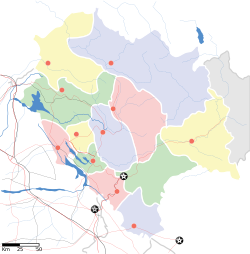Hindur
|
Nalagarh Hindur |
|
|---|---|
| city | |

View of city from the Palace/Heritage Resort Nalagarh
|
|
| Location in Himachal Pradesh, India | |
| Coordinates: 31°03′N 76°43′E / 31.05°N 76.72°ECoordinates: 31°03′N 76°43′E / 31.05°N 76.72°E | |
| Country |
|
| State | Himachal Pradesh |
| Population (2011) | |
| • Total | 10,708 |
| • Rank | 15 in HP |
| Languages | |
| • Official | Hindi |
| Time zone | IST (UTC+5:30) |
| Vehicle registration | HP-12 |
Nalagarh is a city and a municipal committee in Solan district in the Indian state of Himachal Pradesh. It was the seat of the eponymous Rajput princely state, founded in medieval period as the state of Hindur. At present Nalagarh is an emerging town for industries as it hosts production units for leather, steel, chemicals, thread mills and breweries; thus air pollution is quite a concern here. It is situated at 65 km distance from nearby major city Chandigarh. It has further been reduced to about 40 km after the opening of Chandigarh Siswan road.
Nalagarh is a gateway to Himachal Pradesh in North India, 300 km of north Delhi and 60 km from Chandigarh. It was founded by the Chandela Rajputs in 1100 AD under the name Hindur. The Fort of Nalagarh, which was built in 1421 during the reign of Raja Bikram Chand on a hillock at the foothills of the mighty Himalayas, affording a panoramic view of the Shivalik hills beyond the Sirsa river, henceforth gave its name to the state, which further enjoyed indirect rule during the British Raj as a non-salute state.
In the early twentieth century, Nalagarh State was one of the Simla hill states, under the government of the Punjab. The country was overrun by the Gurkhas for some years before 1815, when they were driven out by the British, and the raja was confirmed in possession of the territory. Grain and opium have, in the past, been main agricultural products.
Nalagarh was ruled by the Chandela Rajputs, who originated from Chanderi in the Bundelkhand region of central India. Various other Rajputs then inhabited this place including Thakurs, Tomara, Rathore, Parmar, Pawar, Panwar, Chauhan, Bais. Many have now stayed back as farmers in the Chikni Sirsa Valley
...
Wikipedia


